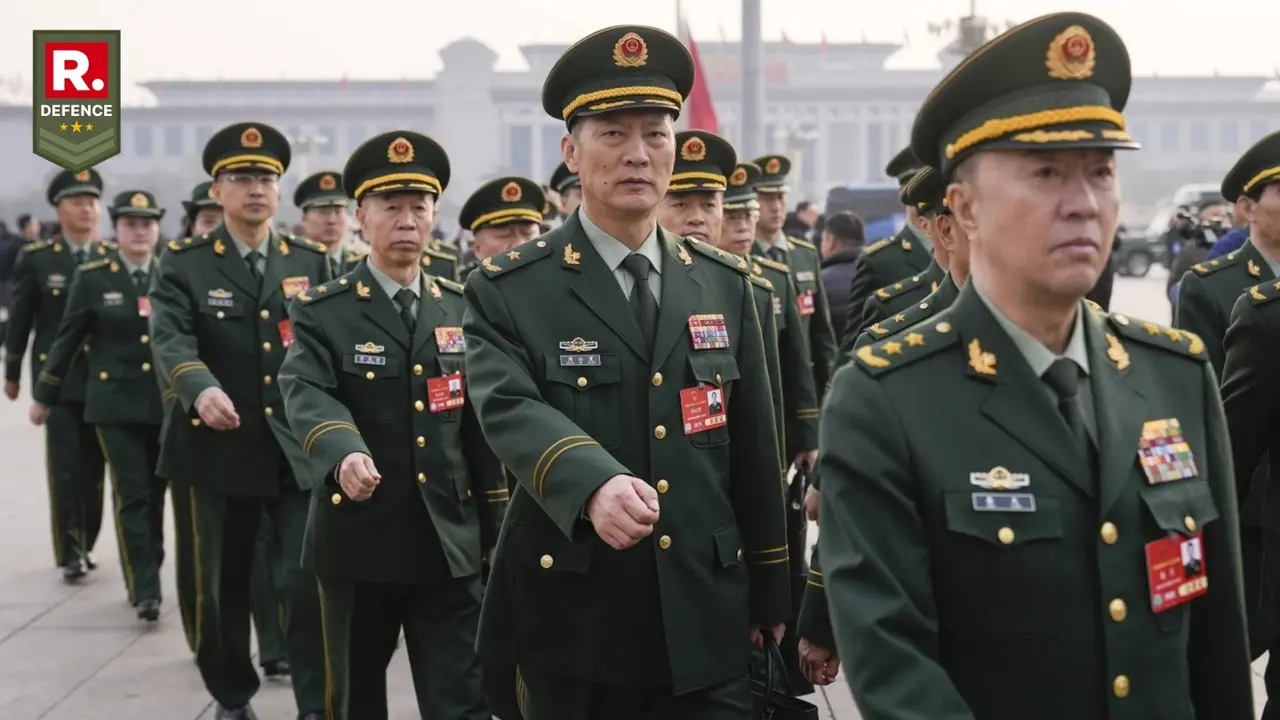Updated 19 March 2025 at 17:44 IST
How China Turned Xinjiang into an Open-Air Prison for Uyghurs Where Culture, Faith, and Freedom Are Criminalized
Xinjiang has become an open-air prison for the Uyghur people, as the Chinese Communist Party (CCP) imposes a brutal campaign of mass detentions.
- Defence News
- 5 min read

Xinjiang, China – Beneath the glossy façade of China’s economic rise lies a grim reality—one the Chinese Communist Party (CCP) would rather the world ignore. Xinjiang, home to the Uyghur people, has become a sprawling open-air prison, where mass detentions, coercive assimilation, and relentless state surveillance have transformed an entire ethnic group into a community of silent sufferers.
Beijing’s official narrative presents its policies in Xinjiang as counter-terrorism measures, but the evidence tells a different story—one of cultural erasure, forced labour, and crimes against humanity.
A Bloody History of Betrayal
China’s repression of the Uyghurs is neither new nor accidental. For centuries, the Uyghur homeland—historically known as East Turkestan—has been caught in the crosshairs of competing dynasties. The Qing Dynasty saw periods of both empowerment and oppression for the Uyghurs, but with the rise of Communist China in 1949, the noose tightened. Led by the ruthless Wang Zhen, the Chinese military crushed Uyghur resistance, dismantling local autonomy and imposing brutal land reforms that dispossessed Uyghur farmers.

The CCP’s justification? National security. The reality? A calculated effort to bring Xinjiang under Beijing’s iron grip.
Advertisement
By the 21st century, the so-called “autonomous region” was anything but autonomous. What started as economic marginalization quickly escalated into full-fledged cultural destruction. The construction of re-education camps, mass surveillance, and demographic engineering became China’s preferred tools for “pacifying” the region.
Beijing’s Re-Education Camps: A Crime Against Humanity
China’s crackdown intensified under Xi Jinping, who declared a “People’s War on Terror” in Xinjiang. The result was the creation of sprawling concentration camps—euphemistically branded vocational training centres—where over a million Uyghurs were detained without trial. Survivors’ testimonies paint a horrifying picture: brainwashing sessions, forced renunciations of Islam, physical abuse, and sexual violence.
Advertisement
Children were forcibly separated from their parents and placed in state-run orphanages to be indoctrinated with Communist Party ideology. The goal was clear—break the Uyghur spirit and erase their cultural identity, one generation at a time.

Despite mounting evidence, Beijing remains defiant, denying human rights abuses while launching an aggressive propaganda campaign to reframe its crimes as necessary “counter-extremism” measures. The world has seen this playbook before, and it reeks of totalitarianism.
The Urumqi Bus Bombing: A Desperate Act in a Desperate Struggle
China’s policies in Xinjiang have fostered resentment, leading to sporadic unrest. One such incident occurred on March 18, 2008, when a Uyghur woman allegedly detonated a bomb on a city bus in Urumqi, the regional capital. Chinese authorities immediately classified the attack as terrorism, using it to justify even harsher crackdowns.
But what Beijing refuses to acknowledge is the deeper issue: the oppressive environment that fuels such desperate acts. When a peaceful protest is met with bullets and basic rights are criminalized, resistance—violent or otherwise—becomes inevitable. The Uyghurs are not terrorists; they are a people pushed to the brink, fighting for the survival of their identity.
Systematic Erasure: Language, Religion, and Heritage Under Attack
China’s assault on Uyghur culture extends far beyond mass incarceration. In an effort to Sinicize Xinjiang, the government has outlawed Islamic practices, demolished mosques, and criminalized fasting during Ramadan. Uyghur-language schools have been shut down, and replaced with Mandarin-only education designed to erase native identity.

In a particularly cruel move, Chinese authorities have banned women from wearing headscarves and men from growing beards—both fundamental expressions of the Uyghur faith. This is not counterterrorism; it is cultural genocide disguised as policy.
The Economic Carrot—and the Brutal Stick
China’s treatment of the Uyghurs also serves a strategic purpose. Xinjiang is a key node in Beijing’s ambitious Belt and Road Initiative, and the CCP views the Uyghur population as an inconvenient obstacle. By forcibly relocating Uyghurs and resettling Han Chinese in their place, Beijing aims to neutralize resistance while cementing its economic dominance in the region.
The forced labour industry in Xinjiang is another grotesque element of this oppression. Uyghur detainees are exploited in textile and agricultural sectors, supplying global brands with products tainted by modern-day slavery. Companies worldwide have been complicit, either through direct sourcing or willful ignorance.
The World Watches, But Will It Act?
Despite irrefutable evidence of atrocities, the international response has been frustratingly weak. While countries like the U.S. have recognized China’s actions as genocide, many Muslim-majority nations have chosen silence—a silence bought with Chinese investment and debt diplomacy.
Global organizations, including the United Nations, have failed to take decisive action, with China’s influence over international institutions effectively shielding them from serious consequences. The same China that censors its own people has managed to muzzle the world’s outrage with economic leverage.
For all its claims of modernity and progress, China remains trapped in a colonial mindset—one that views ethnic minorities as subjects to be controlled rather than citizens to be respected. The Uyghurs are not extremists, nor are they separatists by default. They are a people who have been robbed of their homeland, stripped of their identity, and branded as enemies in their own land.
Published By : Yuvraj Tyagi
Published On: 19 March 2025 at 17:44 IST
